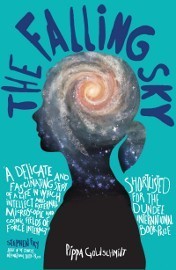What do you think?
Rate this book


263 pages, Paperback
First published April 1, 2013
‘It’s funny how we concentrate on the things we can see, the galaxies and stars, and we forget about the absences. All the spaces in between. But they’re just as important. Trying to work out why things aren’t there is just as important as why they are.’ [loc. 3845]
There are two narrative threads to The Falling Sky: 'Now', and 'Then'. 'Now' tells of Jeanette, an astronomer living in Edinburgh, and her observation of something that appears to contradict the Big Bang model of the universe. 'Then' is the story of Jeanette's youth, growing up first in the shadow of her sister Kate, a talented swimmer, and then in the silent void left by Kate's sudden, accidental death, which their parents never talk about in front of Jeanette.
I found astronomer-Jeanette engaging, with her momentous discovery, her poor social skills and her fraught love life. (She's a lesbian, but not an especially proactive one.) Goldschmidt, who says in the afterword that 'I wanted to bring to life the process of doing astronomy and show both the beauty and the uncertainty of that process', is good at conveying both the sense of wonder and the humdrum routine of a professional astronomer's life. Jeanette's desire to open up her research for discussion causes friction with those around her, and her observational talents desert her when they are focussed on other people.
There's some resolution to the story, and some sense that Jeanette is beginning to deal with her sister's death and with the other losses she's experienced: but I wanted more sense of closure, of completion, of questions answered. Perhaps that's the problem with astronomy as a metaphor, though: 'the uncertainty of that process'.
I visited Blackford Hill (the site of Edinburgh's Royal Observatory, and the setting for some of the novel) last year. I think it's coincidence that The Falling Sky surfaced from the un-downloaded depths of my TBR quite soon after that visit.